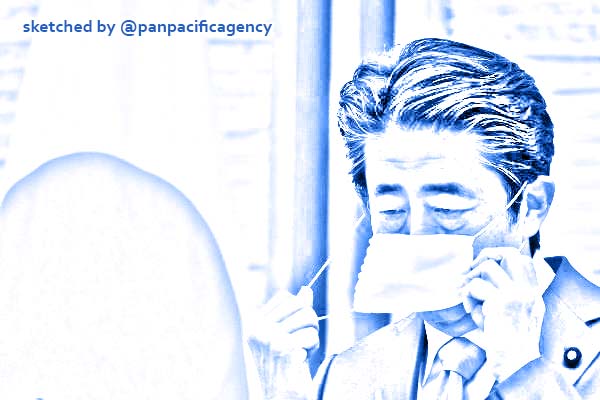Face mask row in Japan over cost of 80M left in storage unused

Japan's Prime Minister Shinzo Abe removes a protective face mask prior speaking during a news conference where he announces an extension of the nation's state of emergency amid the spread of the coronavirus disease (COVID-19) at the Prime Minister's Office in Tokyo, Japan, 4 May, 2020 (Photo: Reuters/ Eugene Hoshiko/Pool). Sketched by the Pan Pacific Agency.
TOKYO, Oct 28, 2021, The Guardian. Wearing masks may be near-ubiquitous in Japan, but the government has come under fire after it was revealed that more than 80m face coverings it procured at the start of the coronavirus pandemic are still in storage, at a huge cost to taxpayers, The Guardian reported.
The government secured 260m washable cloth masks early last year to distribute to every household in Japan after public anxiety over the virus emptied stores of medical versions.
The government planned to send 120m coverings – nicknamed “Abenomasks” after the then-prime minister, Shinzō Abe – to households and an additional 140m to nursing and childcare facilities.
However, the Nikkei business newspaper reported this week that 82m masks intended for care homes had not been sent as of March this year. Instead, the items – worth ¥11.5bn (£74m) – remain in storage.
The Abenomasks – a play on the then leader’s economic policy, “Abenomics” – quickly invited ridicule on social media. Many people said they were too small, while others complained that they had been sent defective or dirty masks. Some said they had received theirs late or not at all. There were questions, too, over the decision to send just two masks to each household.
Reports said tens of millions of the face coverings had yet to be distributed by the time the nationwide mask shortage had been resolved in July last year.
Aside from the cost of making the masks, storing them is thought to have cost ¥600m between August 2020 and March this year, the Nikkei said, citing information from sources connected to the country’s audit board.
After confirming the accuracy of the Nikkei story, the deputy chief cabinet secretary, Yoshihiko Isozaki, said the government had switched to sending the masks to care facilities on a request-only basis, which had led to the surplus.
Isozaki denied that the government had wasted taxpayers’ money by overestimating demand in the first few months of the pandemic, insisting that the masks had been an “effective way to prevent infections amid the supply shortage last year”.
“Based on the situation at the time, I think it was appropriate,” he said, according to the Kyodo news agency, adding that officials would try to find a way to put the leftover masks to good use.
“Abenomask” was trending on Japanese Twitter following the Nikkei report, with opposition politicians accusing the government of wasting public money.
“We called for the plan to be changed many times, but prime minister Abe saw it as necessary,” wrote Renho, a senior member of the Constitutional Democratic party of Japan. “Now no one, including Abe, is wearing the Abenomask.”
While Abe’s cloth masks were unpopular, the widespread wearing of shop-bought masks has been credited as one factor in the recent dramatic decline in Covid-19 cases in Japan.
The latest daily report showed just 321 new infections, compared with more than 25,000 in late August.
The recent drop prompted the government on Monday to lift emergency restrictions on bars and restaurants, which for several months had been asked to close early and refrain from serving alcohol.
After a slow start, Japan’s vaccine rollout has quickly gathered speed. More than 70% of the country’s 125 million population has now received two Covid-19 jabs, according to government figures.